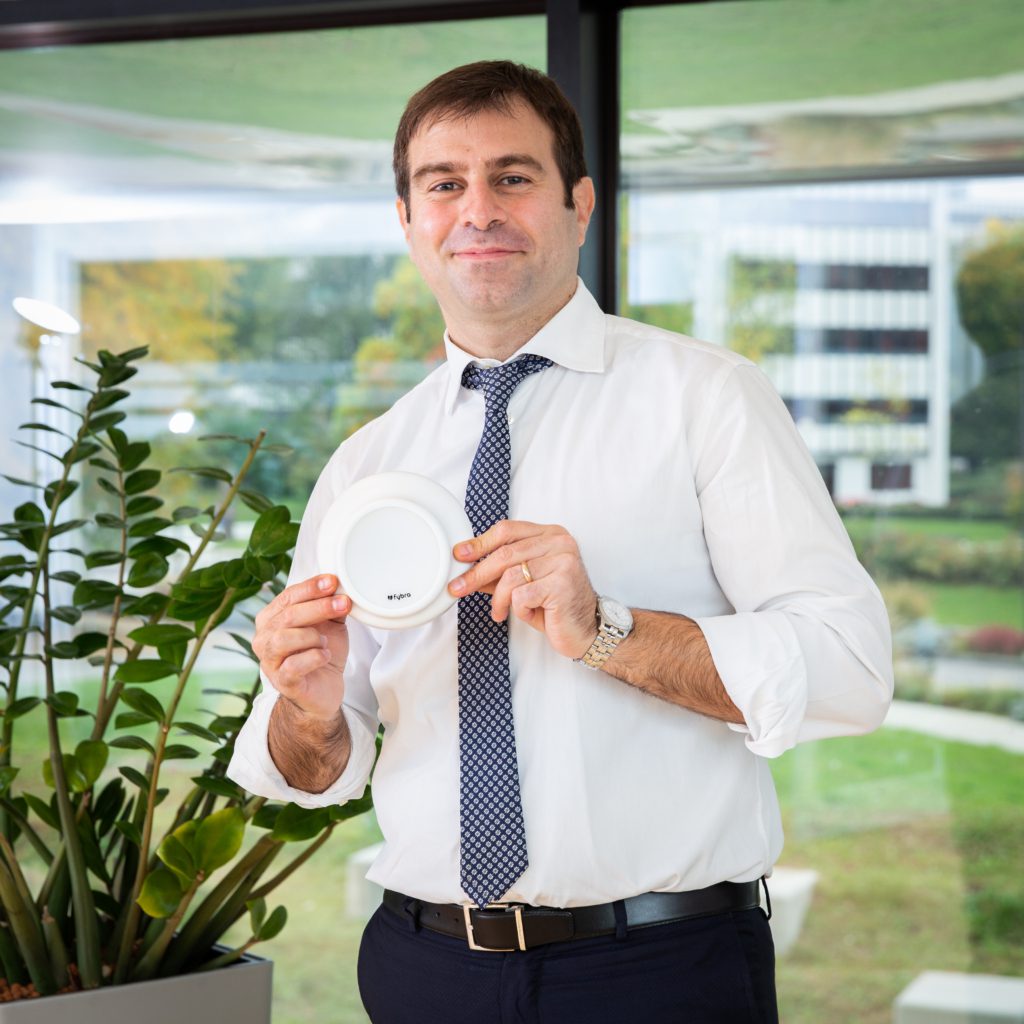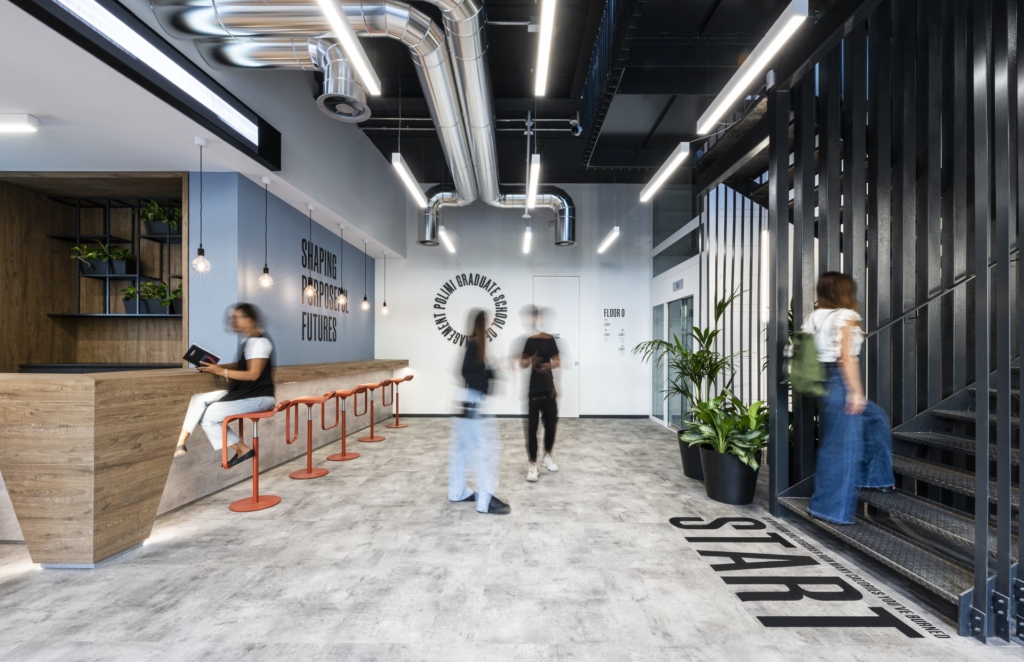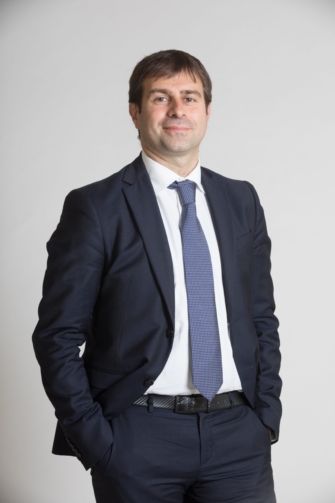
Gaetano Lapenta, co-founder of Fybra, is an award winning entrepreneur. He credits his Executive MBA from POLIMI Graduate School of Management in Milan, Italy, for helping launch his company. Courtesy photo
Gaetano Lapenta says he wasn’t an entrepreneur before enrolling in the executive MBA program at POLIMI Graduate School of Management in 2017. He became one.
Lapenta, 45, of Milan, Italy, is CEO & Co-Founder of Fybra, a cloud-based smart sensor that detects poor air quality in a closed room, indicating the need for better ventilation. He got the idea from his daughter’s classroom, fine tuning it just before the start of the pandemic hit in January 2020. The device is now used in schools, offices, and private homes across Italy with growing interest from neighbouring countries.
In April 2022, the Financial Times named Lapenta an Alumni Changemaker as part of its Responsible Business Awards. In January, he was named Association of MBAs’ (AMBA) Entrepreneur of the Year for 2024.
Before his EMBA, Lapenta built a successful career as a manager in multinational companies, including head of innovation at the Focchi Group. But he longed for something with more direct impact on the world around him.
His time at POLIMI gave him the confidence to launch Fybra. “I had to learn how to address investors, how to create from scratch an idea, a product, the whole service. How to test the new features of the service,” Lapenta tells Poets&Quants.
“Before my EMBA I had failed four times in building up something. After the EMBA, I am running a fast horse with high potential, which is real and impacts 300,000 people daily. I guess my EMBA was worth the investment.”
A B-SCHOOL BUILT ON INNOVATION AND SUSTAINABILITY
In 2021, MIP Politecnico di Milano, rebranded to POLIMI Graduate School of Management with a goal of becoming one of the most innovative business schools in the world, dean Federico Frattini told P&Q in this 2022 interview. Sustainability is a top priority.
“We want to be a place of experimentation where innovative, practical and applicable solutions are born to solve the most pressing problems that our society is experiencing,” Frattini says.
“A school capable of promoting a true sense of community that brings together students, teachers, and alumni, but also all the school staff. An institution that is committed to inspiring and promoting a genuine commitment to making our planet and society better, more sustainable, more equitable, and more inclusive places.”
Entrepreneurship is a growing hallmark at most of the world’s top ranked MBA programs. They’ve built whole ecosystems around building and supporting new ventures through incubators, accelerators, startup competitions, and more.
It’s less common (but becoming more so) to see executive MBAs pivot from established leadership careers into building something brand new and from the ground up.
But, that’s precisely what Lapenta did with his cofounder, Marco Scaramelli, 18 months after earning his EMBA. His experience at POLIMI made it possible, he says.
Lapenta recently described his founder journey to Poets&Quants For Execs. Our Q&A is posted below.

POLIMI Graduate School of Management in Milan unveiled its new campus in Navigli, Milan’s creative and cultural center, in late 2022. Courtesy photo
Let’s begin with your professional background.
Before becoming an entrepreneur, I worked as a manager in multinational companies, including the role of head of innovation in the construction industry. Yet, I felt like I was missing out on something. I was restless to make a deeper impact on society.
So, after completing my EMBA at POLIMI Graduate School of Management, I co-founded my Milan-based company, Fybra, in 2021 to solve a personal challenge: poor indoor air quality faced by my daughter and many other schoolchildren. Fybra develops IoT devices that optimise ventilation in existing buildings, and at the same time ensures the highest possible energy efficiency related to ventilation. The whole system is based on data and patented algorithms.
From a venture whose products benefited 20,000 people, mainly in schools, in the first year, the company has expanded massively, now reaching more than 300,000 people including those in offices and homes.
When and why did you start thinking about getting an EMBA?
I started my EMBA journey in 2017. Ultimately, I pursued an EMBA because I felt a kind of a passion that was burning from inside, a passion to deliver real benefit to society. But I did not have the tools to deliver it. Now that my aspiration has become a real business and my full time job, I can tell this is due to the skills I learned in the MBA.
Tell me about Fybra. What is its mission, value, purpose?

Gaetano Lapenta, POLIMI EMBA ’19
While studying for my Executive MBA with my friend, Marco, we decided to patent a system that we had fine-tuned at my daughter’s school. We had solved a long-lasting problem of hyper isolation (lack of proper ventilation) in that school building with a smart-cloud-based solution.
Our solution was cheap, effective, and seemed to solve a problem of many. It was January 2020, one month before Covid arrived. Then, with the pandemic, we started to receive calls asking for the device. We were “forced” to move on and start our “new” company. Our system – which we called Fybra (For Young BRAins) – was helping indoor spaces to stay safer since it improved ventilation and dispersed aerosol. That’s how everything started.
What help for your venture did you get from POLIMI Graduate School of Management?
The executive MBA at POLIMI GSoM was life changing in my career path. It gave me the tools and even the language to start a company from nothing. We went through fundraising, market-technology fitting, tech development, intellectual property issues for our patents, finance and taxes and much more. And we did it with the right knowledge.
I understand that you were named a global changemaker 2022. Please tell me about that.
In 2022, I was named a Global Changemaker by the Financial Times at the Responsible Business Education Awards. This was in recognition of Fybra and the positive impact it was having on people and users. This award not only boosted visibility but also led to unexpected partnerships with large corporations and collaborations with public authorities. It propelled Fybra’s first steps towards international expansion into Germany and across Europe.
In fact, we had no intention to expand abroad. But, after receiving recognition and visibility through the award, we received numerous requests from Europe. So we collaborated with energy utilities which integrated our solution into their services and, as a company, we secured public grants from municipal governments like Hamburg, allowing us to successfully scale our impact.
Please describe the growth trajectory of Fybra and where the company stands now.
We, as Fybra, were born to make a positive impact at first on my daughter’s school. Then we scaled up to public places, offices and then private houses. In just two years, we served more than 120,000 people daily (100,000 only in schools), impacting 300,000. This means that those people will be in a healthier environment most of the time by lowering disease transmission and improving wellbeing and concentration. They will also save energy and lower their environmental footprint given our third patent Fybra Therm (smart thermovalves that include in the algorithm also the need of ventilation).
Our database is also an educational tool in schools, and we are very proud of that spinoff. Children can learn lessons from their own data on air quality, energy consumption, pollution and so on. Finally, the data we are collecting will be a great value for the whole HVAC industry. We believe we can define new standards for the built environment for the future.
What, in your opinion, sets the EMBA at POLIMI Graduate School of Management apart from its competitors?
I’d say two things, at least from my direct experience. One is the passion for innovation. Every single lesson and experience is focused on nurturing innovators. I felt I was not studying how to become wealthier, or how to boost profits, but how to do that through innovation.
The second is the search for purpose. At POLIMI GSOM, there is a cutting edge team of researchers focused on understanding how purpose is driving growth and how future managers and entrepreneurs will need to focus on that to build sustainable companies.
What other recognitions/milestones would you like to mention in regards to Fybra?
Fybra gained in three years more than 20 awards and recognitions. It has been an incredible journey so far. Yet, if I must pick one, I’d choose the AMBA Entrepreneur of the Year Award in London last January (2024). I was so impressed by the level of the other finalists and also by the jury that I felt like an underdog, an outsider. My co-nominees were so successful while I had to struggle with all the problems of a startup: finance, fundraising, technology, product market fit, IP issues etc. All that struggle was recognized by the jury as the real path of an innovator. In that occasion, globally, I was seen as the example of all those who fight to make innovation happen in the real world. And it was one of those moments that you do not forget.
How would you describe and rate the entrepreneurial resources at POLIMI Graduate School of Management?
POLIMI GSoM has a full structure and ecosystem that supports its fellow entrepreneurs and alumni. Think to the PoliHub (one of the biggest incubators in Italy), or to the courses of entrepreneurship and lean startups. There are courses of machine learning and smart coding for entrepreneurs, finance resources, founders meetings and much more. Also the alumni associations are very active. I also found an investor in the network, which is not that common.
How would you rate the entrepreneurial opportunities as an EMBA student at POLIMI?
I feel that an EMBA student at POLIMI builds its own tool to go into the entrepreneurial journey. Milan is a very lively city and there are a lot of resources in terms of talents, finance and ecosystem. POLIMI stands in the middle of this humus.
How has POLIMI supported you and your venture after graduation?
Well, POLIMI, for instance, chose Fybra and myself as candidates for both the Financial Times and AMBA awards. They gave me the chance to talk to other EMBA classes and supported our mission in many different contexts, also institutional. I feel very backed by the whole school.
DON’T MISS: POLIMI GRADUATE SCHOOL OF MANAGEMENT UNVEILS NEW CAMPUS IN NAVIGLI, MILAN’S CREATIVE AND CULTURAL CENTER AND WHAT HAPPENS WHEN KELLOGG’S EMBA ENTREPRENEURS & INVESTORS START TALKING





Questions about this article? Email us or leave a comment below.